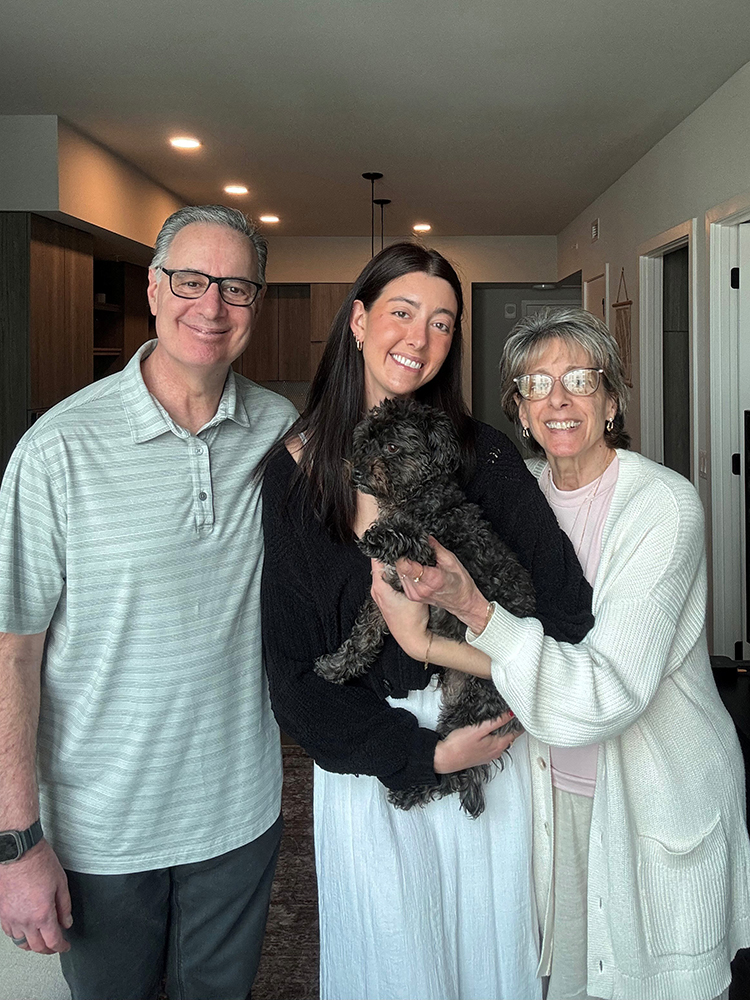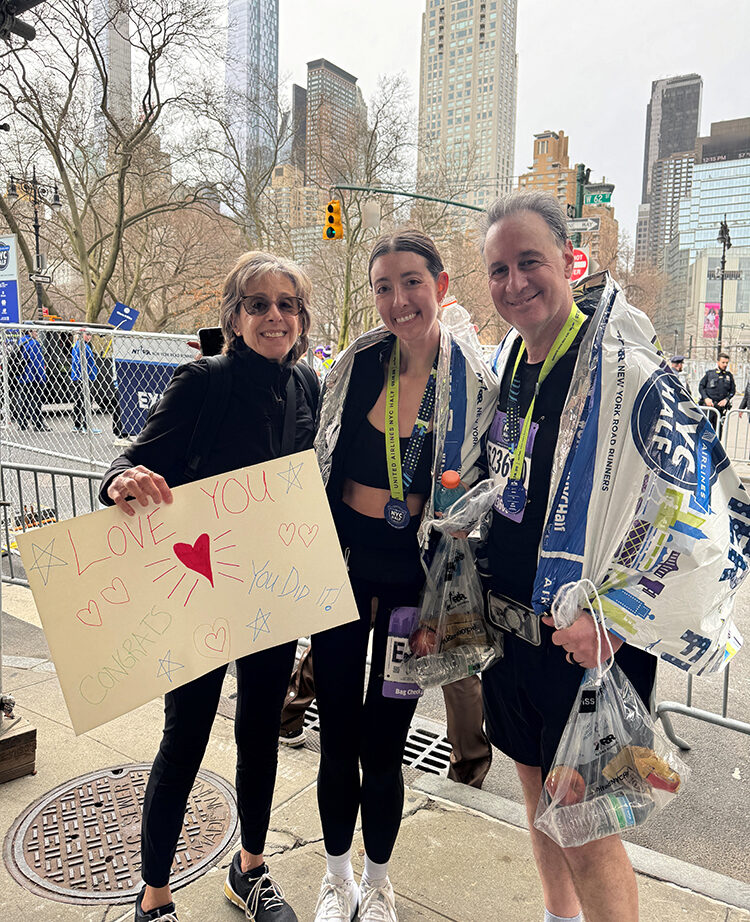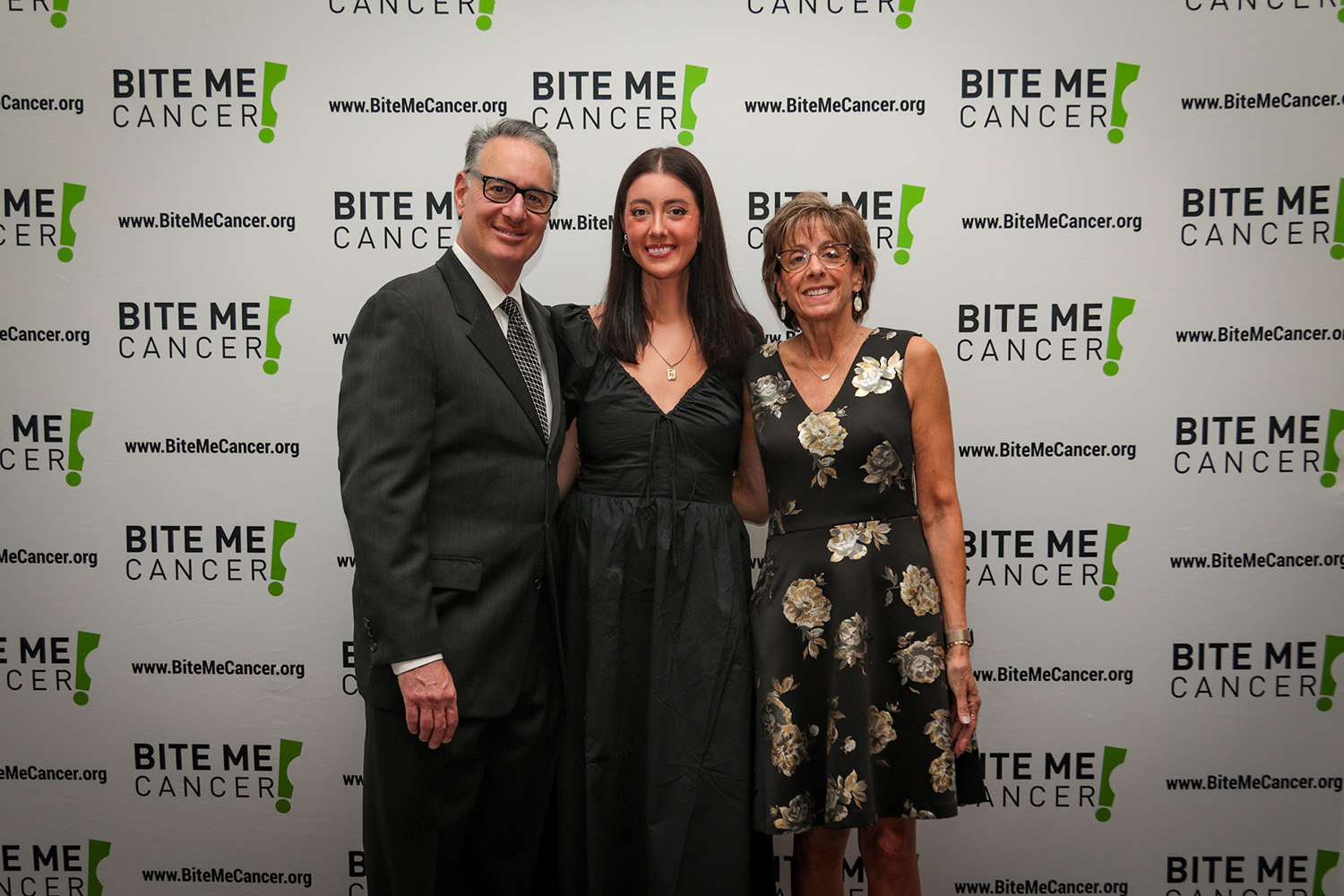For Sharon, life has always been about creating joyful memories—finding tranquility with trips to the ocean, enjoying sporting events, completing 5K+ walks with her daughter and husband, and exploring the family’s roots in Italy. That same energy and spirit of resilience helped carry her through one of life’s most difficult moments: her daughter Nikki’s unexpected diagnosis of sporadic medullary thyroid cancer (MTC).
In 2025, about 44,020 people will be diagnosed with thyroid cancer in the U.S.1 MTC is a rare subtype, making up about 4% of those cases.2
Diagnosed in 2010 at age 17, Nikki had limited treatment options aside from surgery, and she didn’t qualify for clinical trials. However, her doctor knew it was still important for her to receive comprehensive genomic profiling (CGP) and ensured she was tested early.
The Role of Comprehensive Genomic Profiling
A full understanding of the genomic drivers of a person’s specific cancer can often be used to determine potentially effective treatments while ruling out others.3
CGP is a thorough type of biomarker testing that looks for alterations in the DNA of a patient’s tumor cells to better understand the genomic drivers of cancer and inform targeted treatment options for patients in whom a potentially actionable genomic target is detected.
Due to scientific innovations, the number of clinically actionable biomarkers in solid tumors has increased significantly.4,5
Navigating the News of Diagnosis
Leading up to her diagnosis, Nikki had recurring neck and shoulder pain and began visiting the family’s chiropractor, who advised her to have her thyroid tested after no improvement. Six weeks and several appointments later, a radiologist performed a sonogram that identified a 2-centimeter nodule on Nikki’s thyroid. A biopsy of the tumor confirmed she had MTC. Further testing determined there was no family connection of the disease.6
Sharon describes her daughter as incredibly strong, empathetic and positive.
On the evening she learned of her diagnosis, Nikki asked if she could drive to a high school soccer game. Sharon told Nikki that she could make of this news whatever she wanted it to be. “You can be afraid. You can cry. You can be mad. You can turn it into something good. It’s totally up to you,” she remembers saying. Showing Nikki’s determination, she said, “Mom, I want to know if I can drive since I took medicine for the biopsy.”
Once her daughter left, Sharon felt the weight of Nikki’s diagnosis sink in, prompting her to seek answers through online cancer support groups, and rely on close friends and her faith.
Sharon advocated for her daughter’s care, and Nikki was soon assigned to an endocrinologist specializing in her condition. During an initial surgery to remove her tumor, her two surgeons discovered the cancer was more extensive than scans had shown.
“It was the lowest I’d ever felt in my entire life when I realized how much cancer was in her body. I remember the surgeon said, ‘I’m sorry, I’ve never seen anybody with this much spread of MTC before,’ ” Sharon recalls.
From Revisiting Biomarker Status to Renewed Hope

Sharon, Michael and Nikki with their dog. Photo courtesy of LIlly
Over the years, Nikki graduated from high school and went on to college despite facing ups and downs with the initial treatments available. In 2013, in search of a new path forward, Sharon revisited her daughter’s CGP results from years prior with the endocrinologist.
Understanding Nikki’s biomarker status helped them learn about a new investigational treatment that was being tested in clinical trials. Although Nikki was not in the clinical trial, from that point on, each doctor’s visit brought a renewed sense of hope that one day she might be able to receive the treatment once it was approved.
For Nikki, that day came in 2021, when she was able to start that newly approved targeted treatment based on her tumor’s biomarker status. Nikki is now living a life filled with traveling, working full-time and running Bite Me Cancer, an advocacy organization she founded that supports teenagers with all cancers, raises awareness about thyroid cancer and has funded 10 grants for cancer research so far.
The Value of Testing for People With Solid Tumors
With an increase in targeted therapies over the last 15 years, a full understanding of the genomic drivers of cancer is more important than ever. Eli Lilly and Company is working to educate on the importance of timely CGP to inform treatment decisions earlier after diagnosis of a solid tumor and is committed to decreasing barriers to testing.
Sharon feels grateful that Nikki’s doctor knew to test her tumor’s biomarker status early on with CGP but understands many patients do not have that same experience. “Biomarker testing has been in our world. We’re thankful to have had conversations with her doctors to determine the best treatment options for her,” says Sharon.
Even though CGP has become more common for patients with certain forms of cancer, many patients with solid tumors, such as MTC, are often overlooked when it comes to biomarker testing and can face barriers that prevent them from receiving the appropriate therapy.7,8
“I’ve known many adults with MTC who died because they didn’t have available treatments or didn’t know about their options,” says Sharon.
Stories like Nikki’s underscore the value of CGP and the need for increased awareness of targeted treatment options across all solid tumor types, including those that may not be commonly associated with testing.9
Holding Out Hope for New Discoveries

Nikki ran the New York City half marathon alongside her dad while Sharon cheered them on. Photo courtesy of Lilly
As the field of precision medicine continues to evolve with new biomarker discoveries, Sharon recalls being told years ago, “Don’t worry about the future of your daughter’s medical situation based on what we know today because there are new advances on the horizon.”
Nikki continues to hit some incredible milestones. She ran a half marathon with her dad in March 2025, and is celebrating 15 years of survivorship. Through it all, her advocacy organization has delivered nearly 14,000 support bags to teens facing cancer, spreading strength and hope with each one.
References:
- American Cancer Society. Key Statistics for Thyroid Cancer. American Cancer Society. https://www.cancer.org/cancer/types/thyroid-cancer/about/key-statistics.html. Published January 16, 2025. Accessed May 13, 2025.
- Center for Cancer Research. About Medullary Thyroid Carcinoma. National Cancer Institute. https://ccr.cancer.gov/pediatric-oncology-branch/mtc-clinic/about-medullary-thyroid-carcinoma. Accessed May 12, 2025.
- National Cancer Institute. Biomarker Testing for Cancer Treatment. https://www.cancer.gov/about-cancer/treatment/types/biomarker-testing-cancer-treatment#is-biomarker-testing-part-of-precision-medicine. Accessed on April 21, 2025.
- Vidwans SJ, Turski ML, Janku F, et al. A framework for genomic biomarker actionability and its use in clinical decision making. Oncoscience. 2014;1(10):614-623. Published 2014 Oct 22. doi:10.18632/oncoscience.90
- Suehnholz SP, Nissan MH, Zhang H, et al. Quantifying the Expanding Landscape of Clinical Actionability for Patients with Cancer. Cancer Discov. 2024;14(1):49-65. doi:10.1158/2159-8290.CD-23-0467
- Medullary Thyroid Cancer. Cleveland Clinic. https://my.clevelandclinic.org/health/diseases/22873-medullary-thyroid-cancer-mtc. Accessed June 3, 2025.
- Mete O, Boucher A, Schrader KA, et al. Consensus statement: Recommendations on Actionable Biomarker Testing for Thyroid Cancer Management. Endocr Pathol. 2024;35(4):293-308. doi:10.1007/s12022-024-09836-x
- Ball J, Thompson J, Wulff-Burchfield E, et al. Precision community: a mixed methods study to identify determinants of adoption and implementation of targeted cancer therapy in community oncology. Implement Sci Commun. 2020;1:72. doi:10.1186/s43058-02000064-y
- Tsimberidou AM, Sireci A, Dumanois R, Pritchard D. Strategies to Address the Clinical Practice Gaps Affecting the Implementation of Personalized Medicine in Cancer Care. JCO Oncol Pract. 2024;20(6):761-766. doi:10.1200/OP.23.00601
Cancer Today magazine is free to cancer patients, survivors and caregivers who live in the U.S. Subscribe here to receive four issues per year.
Disclaimer: Sponsored advertising content is written by the advertiser and does not necessarily reflect the views of Cancer Today or the American Association for Cancer Research (AACR). Cancer Today’s editorial staff was not involved in developing or creating the sponsored content. Content on the Cancer Today website is not intended to be a substitute for professional medical advice. For diagnosis or treatment of any medical condition or any questions you may have about a medical condition, please consult your physician or other qualified health care provider. Neither Cancer Today nor the AACR is liable for any loss or damage incurred as a result of reading or following the information or engaging with any of the advertising or sponsored advertising content on the Cancer Today website. The mention of any company, service, product or treatment does not constitute an endorsement by Cancer Today or the AACR.






